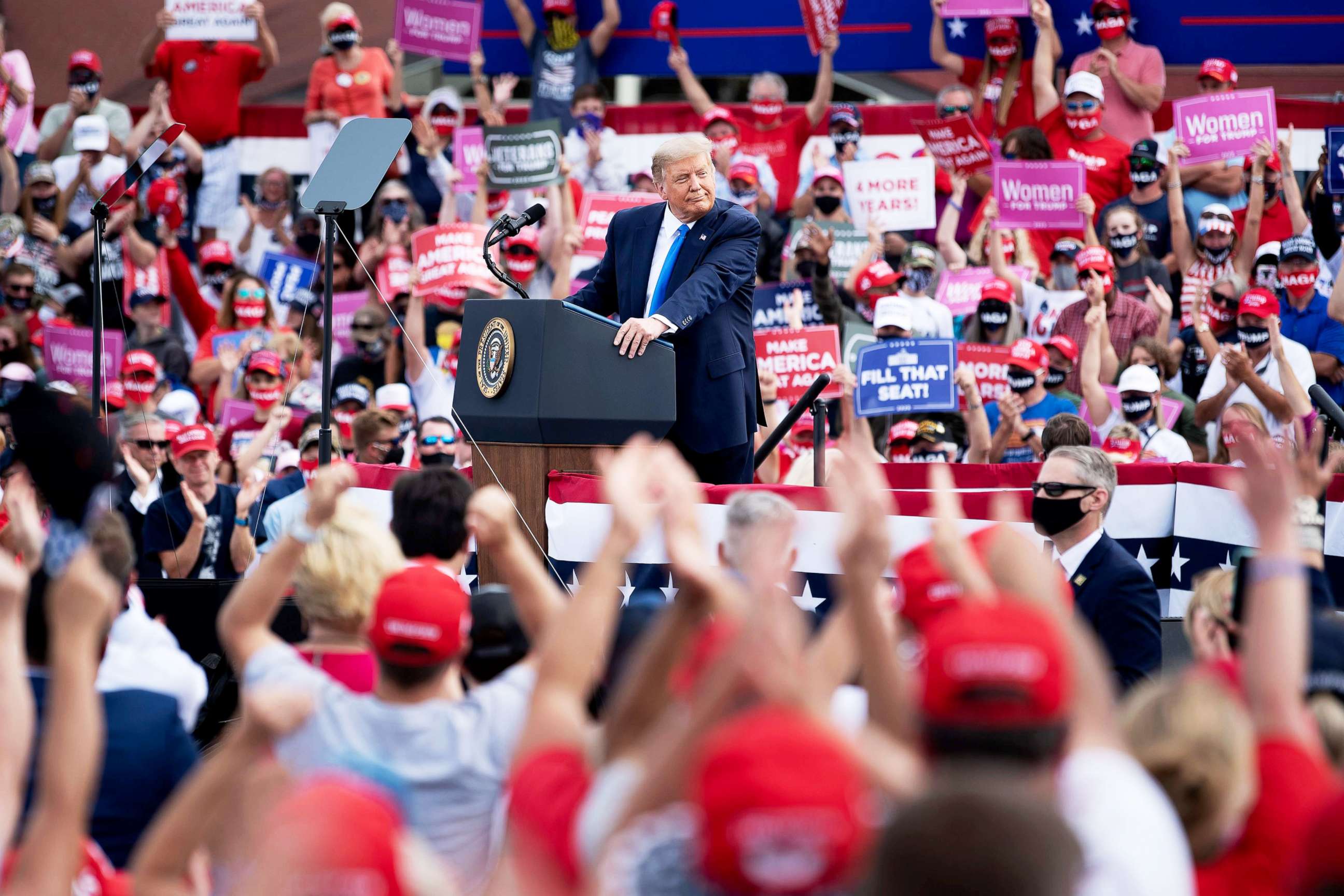Trump falsely cites CDC data on mask-wearing, catching COVID-19
The CDC pushed back on misinterpretations of a study.
President Donald Trump falsely claimed three times on Thursday that a Centers for Disease Control and Prevention study found the vast majority of people who wear a mask contract COVID-19, but several experts say the president misinterpreted the data in a potentially dangerous way as the CDC still recommends everyone wear a mask in public when social distancing isn't possible.
Trump, during a town hall with NBC News Thursday, said that "just the other day, they came out with a statement that 85% of the people that wear masks, catch it."
Moderator Savannah Guthrie immediately pushed back.
"They didn't say that," Guthrie said. "I know that study."
"Well, that's what I heard. And that's what I saw," a defiant Trump replied.

The president made the same erroneous claim during a rally in Greenville, North Carolina, earlier in the day.
"Look at all the masks. You know, they keep saying, 'Nobody wears a mask, wear the mask.' Although then, they come out with things today. Did you see CDC? That 85% of the people wearing a mask catch it, OK?" Trump told the packed audience.
And a Thursday morning interview with Fox News Trump said, "Then you see CDC comes out with a statement that 85% of the people wearing masks catch it," asking, "What's that all about?"

The CDC report Trump was referring to was published last month and found that dining out raised the risk of COVID-19 infection more than other social activities. The study was not designed to look at mask effectiveness but surveyed the behaviors of 314 symptomatic people who sought out coronavirus testing at 11 particular sites around the country in July.
It found that of 154 symptomatic people who had tested positive, 85% said they had worn a mask either "always" or "often" over the 14 days prior to the onset of their illness -- where Trump's number came from. It also found that of the remaining 160 people in the study who reported symptoms but had tested negative, 88.7% said they had worn a mask either "always" or "often."
After the study gained attention on social media this week with users raising questions on the effectiveness of wearing a mask, the CDC tweeted on Wednesday afternoon that "the interpretation that more mask-wearers are getting infected compared to non-mask wearers is incorrect."
Dr. Scott Gottlieb, former Food and Drug Administration chief in the Trump administration, pushed back on the president's inaccurate interpretation Friday morning and stressed that masks are effective in slowing the spread.
"Masks are not a panacea, but they're going to afford you a level of protection," Gottlieb told CNBC. "In an environment where the alternative is having a raging epidemic that's going to force some kind of economic dislocation, I'd rather try to get everyone in masks and I'd rather try to get them in high-quality masks because we know it's going to slow down the transmission. It's going to have an impact."
He noted most studies on the effectiveness of masks have shown that wearing one reduces the transmission of the virus by blocking respiratory droplets.

One of the study's co-authors, Christopher Lindsell, co-director of the Health Data Science Center at Vanderbilt University Medical Center, told CNN in an email Thursday that Trump misrepresented the data.
"The data suggest that among a group of patients who are already showing symptoms that prompted them to get testing for the virus, there was no statistical evidence of a difference in mask wearing behavior between those who tested positive and those who tested negative," Lindsell said.
"This is very different from the question of whether wearing masks prevents you becoming infected with the virus, and it is also different to the question of how many or what percentage of people who wear masks contract the virus. The study was not designed to answer these questions."
Trump's continued false claims come as he pushes for an end to COVID-19 restrictions, repeating on Thursday what's become a mantra to him throughout the pandemic, "The cure cannot be worse than the problem itself."




